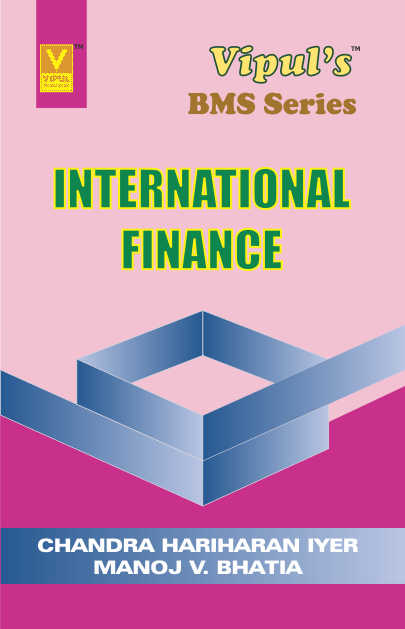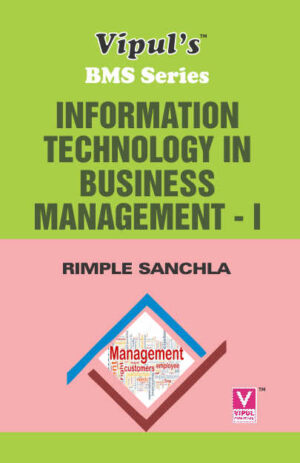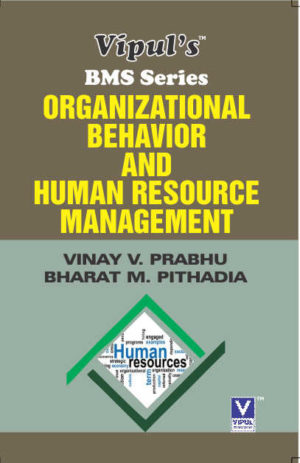International Finance
₹220.00
TYBMS — SEMESTER – VI
Author: Chandra Hariharan Iyer
Manoj V. Bhatia
SEVENTH REVISED EDITION 2025
Description
SYLLABUS
| No. | Modules/Units |
| 1 | Fundamentals of International Finance: |
| (a) Introduction to International Finance:
¨ Meaning/Importance of International Finance, Scope of International Finance, Globalization of the World Economy, Goals of International Finance, The Emerging Challenges in International Finance. (b) Balance of Payment: ¨ Introduction to Balance of Payment, Accounting Principles in Balance of Payment, Components of Balance of Payments, Balance of Payment Identity Indian Heritage in Business, Management, Production and Consumption. (c) International Monetary Systems: ¨ Evolution of International Monetary System , Gold Standard System, Bretton Woods System, Flexible Exchange Rate Regimes – 1973 to Present, Current Exchange Rate Arrangements, European Monetary System, Fixed and Flexible Exchange Rate System. (d) An introduction to Exchange Rates: ¨ Foreign Bank Note Market, Spot Foreign Exchange Market. ¨ Exchange Rate Quotations: § Direct and Indirect Rates. § Cross Currency Rates. § Spread and Spread %. ¨ Factors Affecting Exchange Rates. |
|
| 2 | Foreign Exchange Markets, Exchange Rate Determination and Currency Derivatives: |
| (a) Foreign Exchange Markets:
¨ Introduction to Foreign Exchange Markets, Structure of Foreign Exchange Markets, Types of Transactions and Settlement Date, Exchange Rate Quotations and Arbitrage, Forward Quotations (Annualized Forward Margin) (b) International Parity Relationships and Foreign Exchange Rate: ¨ Interest Rate Parity, Purchasing Power Parity and Fishers Parity, Forecasting Exchange Rates (Efficient Market Approach, Fundamental Approach, Technical Approach, Performance of the Forecasters), Global Financial Markets and Interest Rates (Domestic and Offshore Markets, Money Market Instruments). (c) Currency and Interest Rate Futures: ¨ Introduction to Currency Options (Option on Spot, Futures and Futures Style Options), Futures Contracts, Markets and the Trading Process, Hedging and Speculation with Interest Rate Futures, Currency Options in India. |
|
| 3 | World Financial Markets and Institutions and Risks: |
| (a) Euro Currency Bond Markets:
¨ Introduction to Euro Currency Market, Origin of Euro Currency Market, Euro Bond Market (Deposit, Loan, Notes Market), Types of Euro Bonds, Innovation in the Euro Bond Markets, Competitive Advantages of Euro Banks, Control and Regulation of Euro Bond Market. (b) International Equity Markets and Investments: ¨ Introduction to International Equity Market, International Equity Market Benchmarks, Risk and Return from Foreign Equity Investments, Equity Financing in the International Markets, Depository Receipts – ADR, GDR, IDR . |
|
| (c) International Foreign Exchange Markets:
¨ Meaning of International Foreign Exchange Market, FERA v/s FEMA, Scope and Significance of Foreign Exchange Markets, Role of Forex Manager, FDI v/s FPI, Role of FEDAI in Foreign Exchange Market. (d) International Capital Budgeting: ¨ Meaning of Capital Budgeting, Capital Budgeting Decisions, Incremental Cash Flows, Cash Flows at Subsidiary and Parent Company, Repatriation of Profits, Capital Budgeting Techniques – NPV. |
|
| 4 | Foreign Exchange Risk, Appraisal and Tax Management: |
| (a) Foreign Exchange Risk Management:
¨ Introduction to Foreign Exchange Risk Management, Types of Risk, Trade and Exchange Risk, Portfolio Management in Foreign Assets, Arbitrage and Speculation. (b) International Tax Environment: ¨ Meaning of International Tax Environment, Objectives of Taxation, Types of Taxation, Benefits towards Parties doing Business Internationally, Tax Havens, Tax Liabilities. (c) International Project Appraisal: ¨ Meaning of Project Appraisal, Review of Net Present Value Approach (NPV), Option Approach to Project Appraisal, Project Appraisal in the International Context, Practice of Investment Appraisal. |










